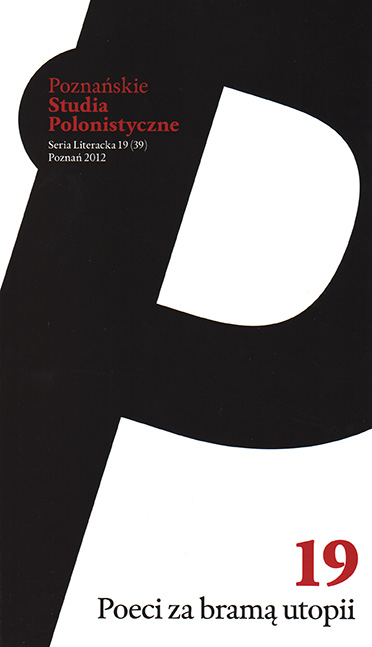Jak objąć poetów nakazem pracy. Eliza Orzeszkowa i Piotr Chmielowski wobec Działu pieśni Leonarda Sowińskiego
How to impose compulsory work scheme on poets? Eliza Orzeszkowa and Piotr Chmielowski and “Dział pieśni” by Leonard Sowiński
Author(s): Radosław Okulicz-KozarynSubject(s): Language and Literature Studies, Studies of Literature, Polish Literature, Philology
Published by: Wydawnictwo Poznańskie Studia Polonistyczne
Keywords: Leonard Sowiński; poetry written after the January uprising; Positivist literary criticism; journalism of Eliza Orzeszkowa; Piotr Chmielowski’s history of literature; campaign against poetry; tendenti
Summary/Abstract: Condemning the hostile attitude of modern poets towards both the manifestations and the very idea of civilizational progress, Eliza Orzeszkowa, in her extensive article Listy o literaturze. Wiek XIX i tegocześni poeci written in 1873, and then Piotr Chmielowski in his Zarys literatury polskiej ostatnich lat szesnastu, illustrated their arguments with a number of poems, including the sonnet Dział pieśni by Leohnard Sowiński. R. Okulicz-Kozaryn starts with reminding his readers that the controversies over the right of poets to put themselves over society, formulate opinions and judgments of civilization and their attempts to promote such values as scientism or utilitarianism, had had a long tradition at the time. By embarking on it, however, Orzeszkowa and Chmielowski appealed to practices of a particular kind, namely to disregard completely the message of a poem and to focus on exploiting it only to support their own arguments. The author of the article analyses the mechanism behind this manipulation and claims that Orzeszkowa, followed by Chmielowski, had even removed some words from the poem that could have been interpreted by the then reader as a sign of affiliation to the acrificed part of his life for these values being sentenced to exile and the following social degradation for his participation in the freedom movement at the turn of the 1850s and 1860s. In the heat of the ideological struggle, Orzeszkowa and Chmielowski did not argue for their own belief and did not even enter into polemics with the most important message in the poem. The truth is that L. Sowiński did not question the civilizational march forward of the mankind but rather showed that, contrary to what the positivists claimed, utilitarianism was just an appetite for enjoying the achievements of progress and maximizing pleasure and was not its diving force, being more like a parasitic residue and a baggage.
Journal: Poznańskie Studia Polonistyczne. Seria Literacka
- Issue Year: 2012
- Issue No: 19
- Page Range: 85-96
- Page Count: 12
- Language: Polish

